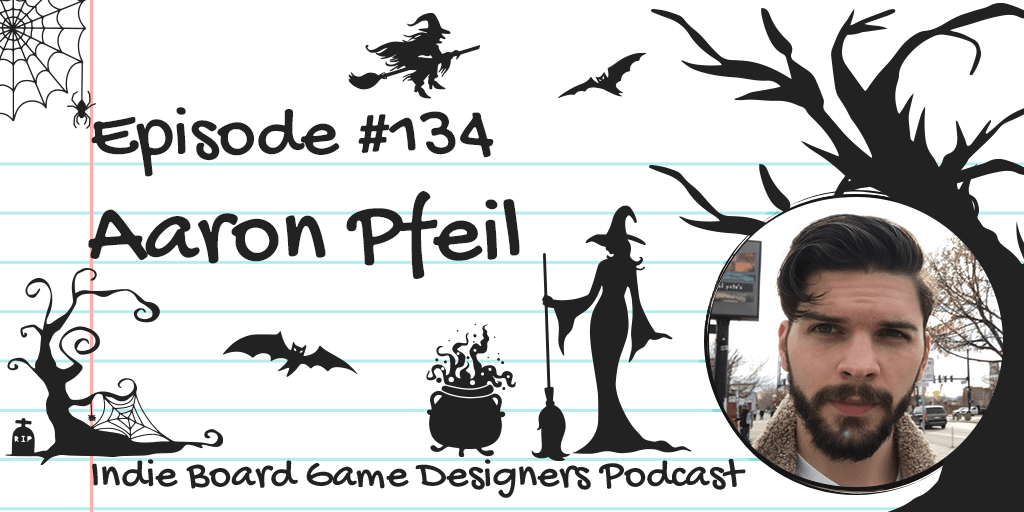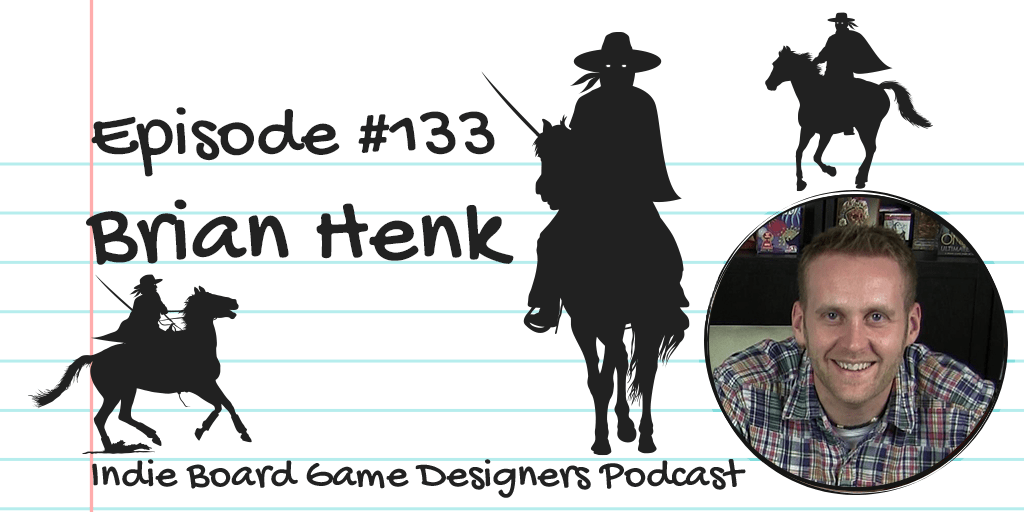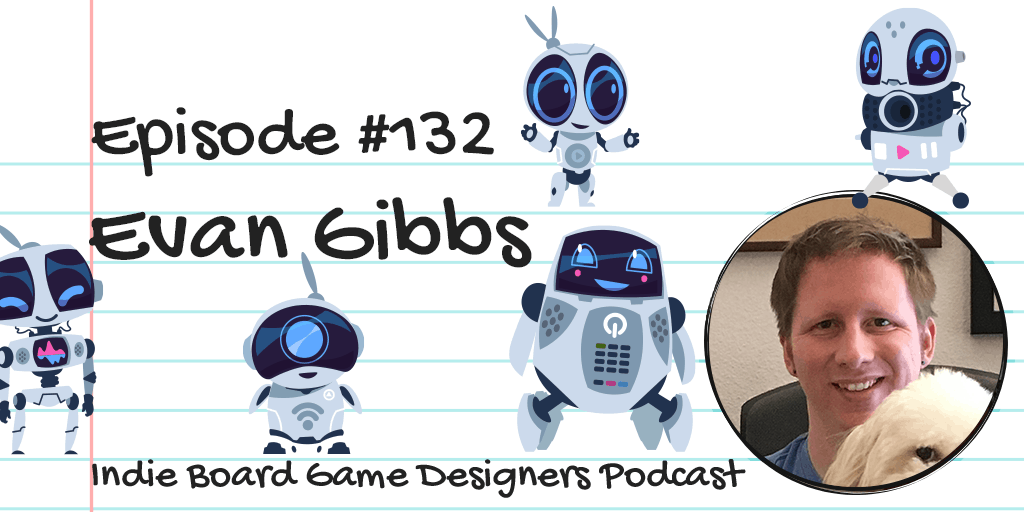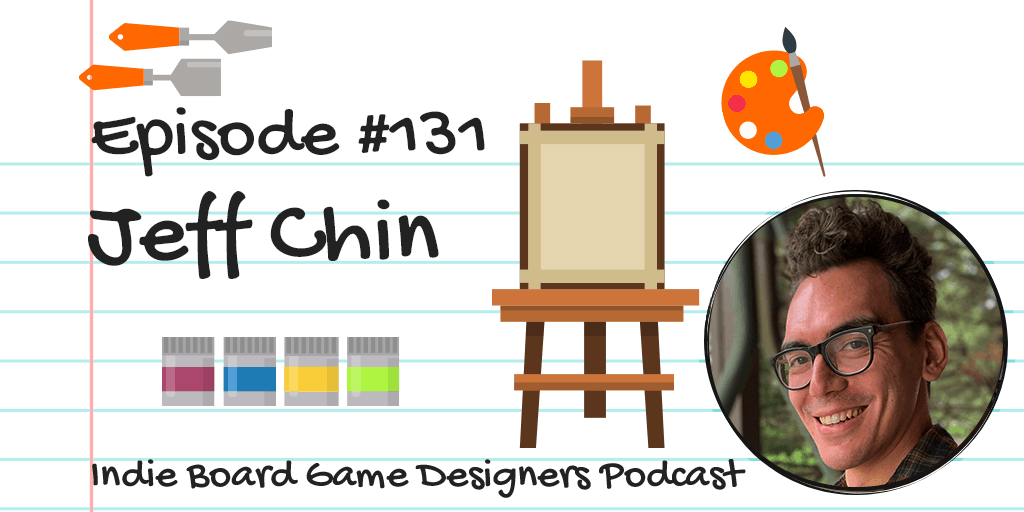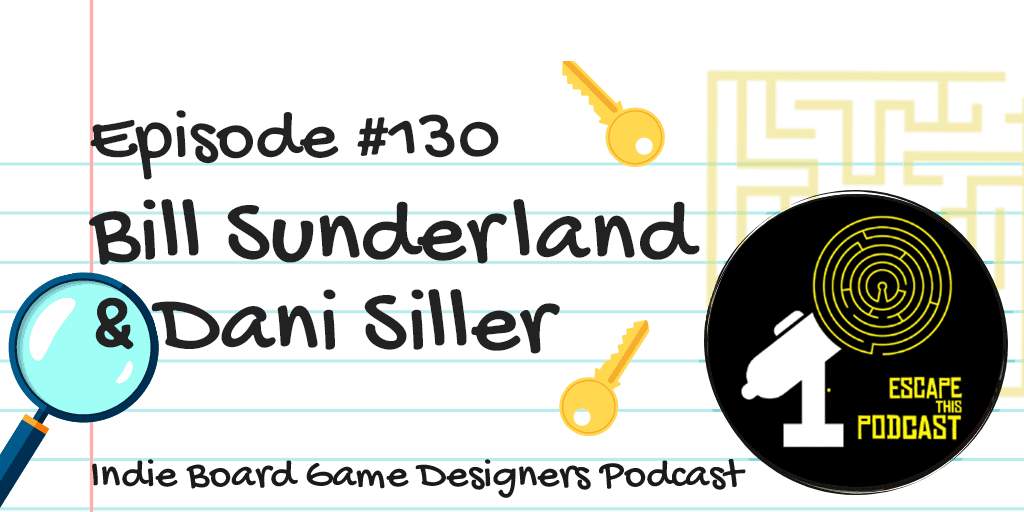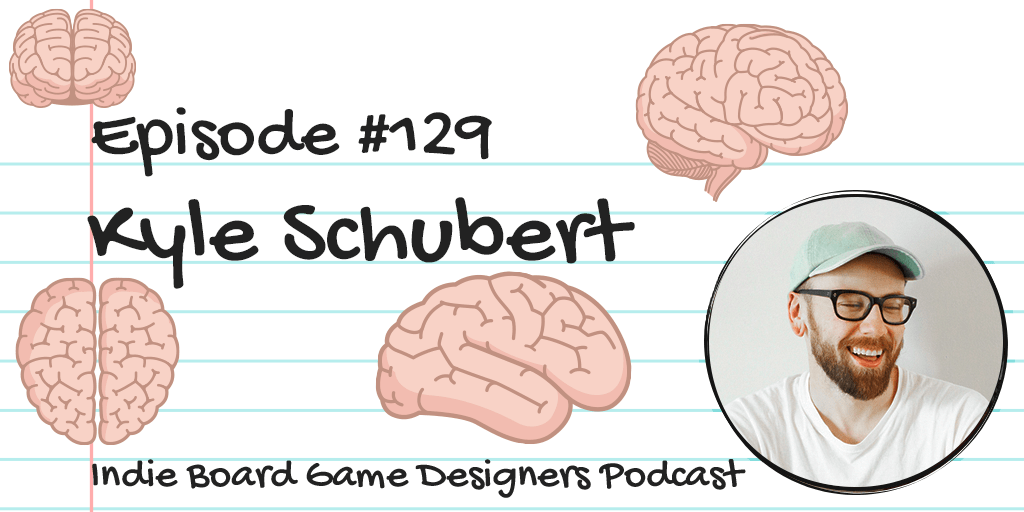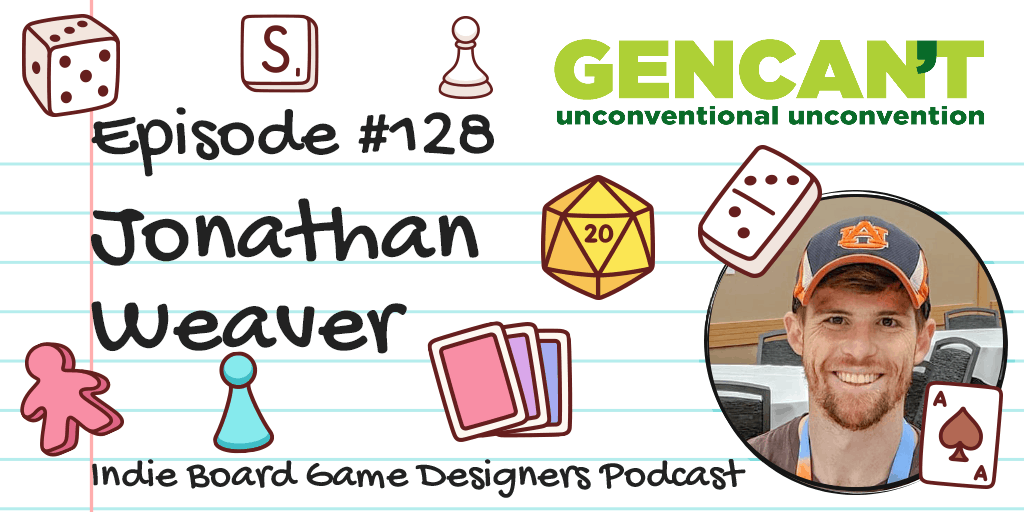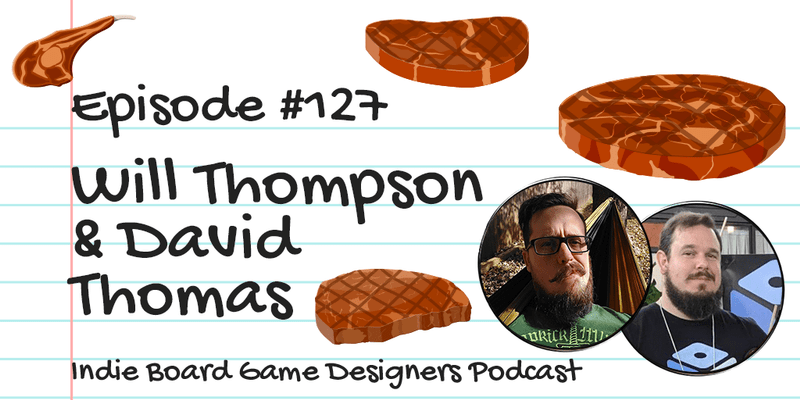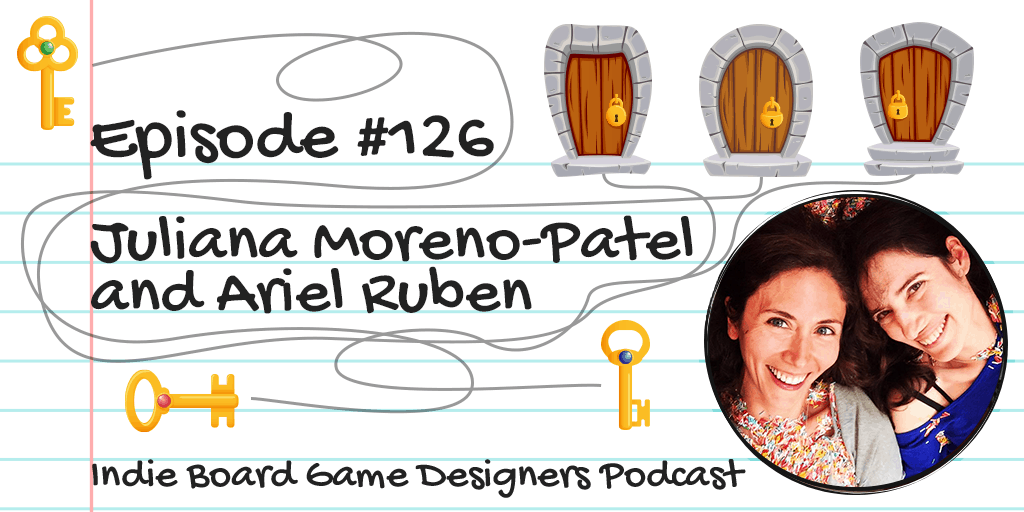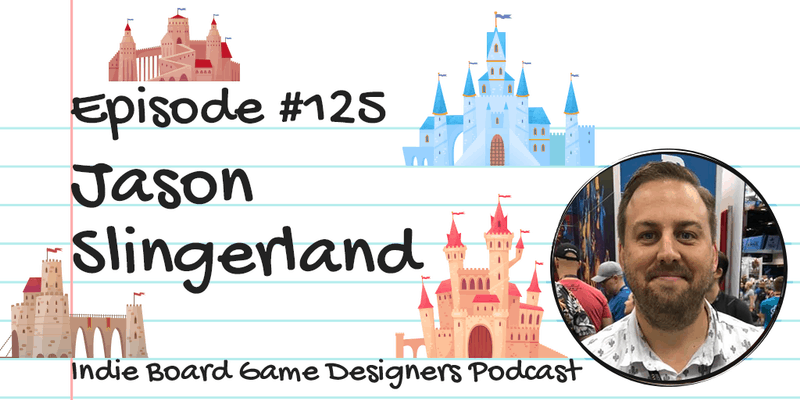Podcast: Play in new window | Download
Subscribe to podcast: Apple Podcasts |
Patrick Rauland: Hello, everyone. Welcome to the Indie Board Game Designers podcast, where I sit down with a different independent game designer, and we talk about their experience in game design and the lessons they've learned along the way. My name is Patrick Rauland, and today I'm going to be talking with Evan Gibbs, who designed Robo Junkyard, which was recently funded on Kickstarter. Evan, welcome to the show.
Evan Gibbs: Thanks so much.
Introduction
Patrick: Yay! We chatted by email, so I'm going to ask you a couple of lightning round questions to introduce you to the guests. Ready?
Evan: OK. Sounds good.
Patrick: OK, favorite transformer, go.
Evan: Optimus Prime.
Patrick: OK, so give me– Do you like him in a humanoid robot form or semi truck form?
Evan: I like that he turns into a truck. That's pretty cool. But I don't know, and he's the frickin' cool leader.
Patrick: I get it.
Evan: I don't know. I feel like the only other answer might be Bumblebee, but I don't know. It's Optimus Prime. He's so cool.
Patrick: Cool. I get that.
Evan: I like that you started off with a nice, easy question for me. Because. a lot of times I'm like, “This one's cool. This one's cool,” but with Transformers, it's all about Optimus Prime.
Patrick: Sweet. Also, he's pretty dope sword. If I recall correctly.
Evan: Yeah, that's right. That's also just the toy that everyone had.
Patrick: How about, what is your favorite robot-themed movie? You know what, no. Any movie with a robot.
Evan: I love The Iron Giant. It's one of my favorite movies. It's absolutely beautiful, and it's heartfelt, and it's well written, and it's about a robot, which is cool.
Patrick: Yeah, that's a great movie.
Evan: It's a special movie.
Patrick: Absolutely. I haven't seen it in many years, but it's great.
Evan: It totally holds up too.
Patrick: Good. Then, what's a game that you play with someone every single time at a convention?
Evan: I like to play Hanabi a lot. I think that's a good game, especially with a lot of people that you don't know even, because it's cooperative. I played it with co-workers that never play games and stuff too, so I think that's a really good game that you can play with everyone in any spot. That's nice, and you're working together. I like that one a lot. Another selfish answer is Swords and Strongholds, which is a two player chess-like game with very few cards in it set in the world of Mouse Guard, which is a comic book. I want to play that game more. I will totally sit down and play that game at any point.
Patrick: I'm looking up that game. I'm not entirely familiar with it, so I'll have to take a look at it later.
Evan: Yeah, it's definitely a lesser known one, but I wanted to shout it out.
How did you get into board games and board game design?
Patrick: Awesome. So, how did you get into board games and board game design?
Evan: Initially, I've been into game design forever. My brother and his friend, when I was a kid, they ran a little DnD group. My brother's friend ran it for me and my brother, I forgot how old I was, but I was young, and I thought it was so cool. Since then, with my friends, I was like, “You guys, we have to play this game. Dungeons and Dragons.” I didn't have any of the books or anything, so I just made up rules for it, and we would play. It's like playing advanced play pretend, and then at some point, we started to incorporate Legos into it. I made a point system about how to build a robot mech, and you'd spend points on the pieces, and they did different things. It was really fun. I obviously didn't think it was going to turn into a career designing games, but I've been into that forever. Then I got into animation, and I started to get into video game design, and it wasn't until a few years ago, I got back into tabletop game design. I had ebbs and flows of playing tabletop games throughout high school and college and stuff, but it was a few years ago– Actually, it must have been six years ago I started designing board games again. But it wasn't until a year or two it was probably a year ago that I was like “OK. I want to produce a board game.”
Patrick: Your Kickstarter funded a couple days before we started recording– Actually, maybe more like a couple of weeks. But your Kickstarter very recently funded, so within a year you went from “I'm going to do this–” Like, it only took you that long?
Evan: No, I was designing games for a little while, and I didn't– It took me a long time to decide that I wanted to produce and Kickstart a game. It was a little while ago, I made a board game for my wife who was my then girlfriend as a present, and then at some point, we started thinking about it and taking it where seriously. Maybe about two, or it would've been three years ago now, and it wasn't until last year that we were like, “Let's do a Kickstarter. Let's do it.” If that makes sense.
When we were chatting via email ahead of time you talked about Mindset and how at first you didn’t want to run a Kickstarter. Can you go into why?
Patrick: Awesome. We were chatting via email ahead of time, and you talked about Mindset, so maybe why don't you tell me why didn't you want to run this Kickstarter? And then, what changed your mind?
Evan: The story with this Kickstarter starts with a different game I designed, I designed that game for my wife, who was then my girlfriend, and I literally just made it for her birthday. It was funny because I was like, “I'll just take three months off of my other side project.”
At the time I had a full time job, I was working on a video game at the time, and then I was like, “I want to take some time off, make this board game as a birthday present.” I thought I'd get it done in three months. I spent three months on it, and then I play tested it, and I was like, “This is terrible.” Then I took another break from it, I came back to it another year later, and I redesigned it completely.
I liked it a lot more, and I gave it to her as a present and then yay, and I thought that was going to be end of it. Then KublaCon, which is a convention that I went to that had a game design contest, and it was literally one of those “I have a game. Why not? I'm going to KublaCon, why not submit it? If it goes somewhere, then it goes somewhere.”
My mindset was never on, “I'm going to make this into a thing.” I was like, “Maybe they'll think it's really good, and then maybe I can pursue it, I don't know.” It was just an experimental thing, and I just thought I'd enter into the contest. It was funny because my mindset at that point was like, “If they like it, maybe I'll pursue it. If they don't like it, then I won't.” Then when I entered the contest it didn't make the finals, which is like– In the finals, that's where they rank people and someone wins or whatever. I wasn't a part of that process at all, but they gave me feedback, and I met and talked to the person, Anthony Galula is his name, he runs the contests at KublaCon.
I talked to him, and I got feedback about how the game should be completely revamped again a second time, making it a third time. At that point, I was like, “I think part of why I wasn't interested in pursuing this is because I wasn't that happy with the game. I was happy enough to give it as a present, but I wasn't like ‘This is a cool thing that a whole bunch of people would like.'” So when I redesigned it, at that point, when I redesigned it, I did it with my wife, and then it got a lot based on the criticism I got from the contest. At that point, I was really happy with it and excited about it, and at that point, I still wasn't thinking that I would produce or run a Kickstarter for it even though I was excited about this game, because I just never thought of myself as a business person.
It's funny because as an artist, you hear this a lot of other people going, “I can't do art.” And you're like, “You can. It's just a trained skill that you're not doing.” I thought the same exact thing about business stuff and marketing and whatever, like “I'm an artist. That's not my field.” It just never clicked with me that this was a thing that I wanted to do, I thought I might pitch it to a publisher or something. But then when I went to the contest– At that point and at that time, it did well, and it made the finals and everything. I was excited about it.
Patrick: Sorry, is this a year later?
Evan: This is a year later, yeah. They run it every year at KublaCon. One year at KublaCon, it did poorly, it didn't do well. So I completely redesigned it, resubmitted it, and then it made the finals and did well. That was cool, and it felt right. The game was– I was really happy with it, and I was excited to show it to people the second time around that I submitted it.
That was cool. So that time, when I showed it, the feedback I got was, “I don't know what to do with this thing. I'm really happy about it. Should I show it to a publisher or whatever?” And then part of the design of it was my wife did the art of it, and we made a theme, and we're really into the way the game is. So she said, “If you sell to a publisher, they'll probably want to change stuff. If you don't want to change stuff, you could publish it yourself. Maybe at that point, maybe a publisher will come. But if you want to run a Kickstarter, that sounds like what you want to do.” I'm like, “I don't know about that. That's not my thing.” And she's like, “You can do it if you're passionate about it enough.” Then at some point, it clicked in me, “I'm sure I can if I wanted to at this point.”
That's the point where it clicked that I was like, “I can just do this.” And when I say “Just do this,” it took a lot of work. But at that point, I started to researching crowdfunding, Kickstarters, advertising, and all that stuff. But that's the point where it changed. I was like, “I can do this if I put in the work to do it, and I'm motivated to do it. At this point, I have a game that I'm happy enough to do that,” so I needed both the “I think I can do this if I set my mind to it,” and also that I want to be happy with my product too. I didn't even realize I was missing both of those things until both of those years at the contest actually, they were the points.
Patrick: Let me go back to two things here, or let me close the loop on one thing. Is that game Robo Junkyard?
Evan: No, it's not. That's a really good question. As I was researching– Yes, sorry. It's funny. As I was researching– When I was designing that game, which is called the Big Pig Game. That game, I was getting into tabletop game design stuff when I was working on the game, and that breeds more ideas for tabletop games, and I started to make another card game on the side while working on that one around the time that the second contest happened.
Then when I was researching Kickstarter and crowd funding, I was like, “I'm sure I can do it if I do the research.” Then when researching a lot, I was like, “There's a lot to this. It might be better to start with a smaller game.” We're working on a smaller game right now, and maybe we should start with that one. So we totally shifted gears and finished that game, and that's Robo Junkyard, and that's the one we ended up kickstarting.
Patrick: This is great. So, going all the way back. Number one is I do think people have self limiting beliefs, where it's like “I'm not a business person. I can't do this.” I love that you overcame that, and you're like, “I can learn these skills. I can work on it.” What's also really cool, I think you avoided a trap of releasing a really big game on Kickstarter, a complicated game or a really expensive game on Kickstarter. This is the other thing I wanted to touch on, and you cued it up perfectly for me. Robo Junkyard, you raised $5,400 dollars. I was literally right before this an hour ago before this call, and I was looking at FrostHaven, the next GloomHaven, wrap up on Kickstarter with just $12 million dollars.
Evan: Yeah. Is that record-breaking, by the way?
Patrick: I don't know. It's up there, probably in the top 10. I don't know if it's record breaking. But it's crazy. It's a huge amount of money, and GloomHaven was already big, and there are many reprints, and now frost haven is coming out. I think lots of people when they get into game design, and they think they can make the next FrostHaven immediately. That's hard. It's hard to make a game that good that's that popular. I love that you intentionally went for a smaller game, but 180 backers with $5,400 bucks? I think that's a great starting point. I give you kudos on that.
Evan: Thank you. I appreciate it. It was a lot of fun, and I'm super happy with how it went.
How do you and your wife work on games together?
Patrick: Cool. OK, so you said you got your wife to help you with this first game, and then also I know she's the illustrator for Robo Junkyard. How do you get her to work on all of your games? That's because I have an artistic partner, and she has not helped me with my games.
Evan: That's a good question. I got her to help on the Big Pig Game by designing it twice, and then at some point, she liked it. No, but she's an artist by trade. She's a textile designer, but she does great illustrations, so when we were doing the Big Pig Game, those were her characters that I based the game off of already. So, her doing the art for that game already gelled. Robo Junkyard was a little different because it was a card game that I basically had designed the mechanics of without a theme at all. It was totally abstract, and I brought it in front of her and was like, “Let's test it.” She was my guinea pig, the very first iteration, which is always bad and very different than what it ends up being. She is a harsh critic in that sense because she doesn't play all that many card games, which is great because she's a good critic because the game changed a lot based off of her feedback. I kept basically going, “Come on. Play this game with me, I need help with it and fixing it” and all this stuff.
Then I would play test in front of other people, and at some point, I was like “OK. The mechanics are good. It went from a two player competitive game to a 2-4 player fun party-ish game. It was fun, but it needed a theme. When we were talking about it, that's when she attached herself to the project. Because she likes building the characters and bringing the theme into the game, and it makes it a lot more fun for her. Before that, it's just her play testing it. When we started talking about the theme, she jumped in and was like, “OK, robots. I'm not sure if that can work, how can that work?” Then we sketch stuff together, and that's when she attaches herself to it.
Patrick: Awesome. I love hearing that, and I can totally get when someone has input, they are a lot more interested in helping out. It's not like, “Help me pack boxes.” That's not very exciting. But if it's “Help me design the theme and the robots in this world,” that's far more intriguing.
Evan: Yeah, exactly. Because she designed the robots. She did that, and then she got a favorite robot and then when we played, it was more interesting, then the rules changed a little bit based on the theme. There was a little bit of melding there too. She would make a suggestion like, it was her suggestion that each of the robots have their own unique card. I was like, “That makes a lot of sense.” Because that wasn't in it before, there was a theme, and it helped the game a lot.
What’s something you learned from this podcast?
Patrick: Great. So one of the reasons you reached out to me, and it's great when that happens, is that you've been listening to the podcast. I think I've had a couple of– I've asked this question only a couple times, but what is something that you've picked up from this podcast that you would like to highlight or expound or elaborate on?
Evan: I have two answers to this if that's OK. I have a broad answer just from listening to other creators, which is just we're all people. It's funny when you just play a game, and you don't know the story of where it came from or anything, and you don't even think about it. You're just playing a game. But listening to people and their trials of going– All of the problems they have when they're producing stuff, or their thought process when doing it. It's like, “Yeah. This is what I'm doing, and I feel connected with people, which is cool.” That's nice, and it helps just motivate to do stuff.
One small specific one was I think you did– It was the Overrated/Underrated. I forgot who it was with, but it was on– You said, “Overrated or underrated on games that you buy that have more than one game in it. Like a deck of cards versus Robo Junkyard or Boss Monster, or whatever.” The person you had on said, “You get more bang for your buck if you if you get more games with it.” Your response was, “Yeah. But I think by setting the game by itself when you get a theme for it, and it's all designed towards that one thing, you get something from it. There's some value there.” That clicked to me.
Patrick: So, it was me disagreeing with a guest?
Evan: Yeah, totally. It was part of the conversation. But you saying that changed my mind on it too, because I was like, “It would be better if all games could just have more versions, more things you could play with it. Then you saying that made me say, “Actually, I think there is a lot of value in having the one core thing that's well-designed and fit.” It's how a lot of games, I think, should narrow their number of players a little bit more. Because the game is better fit. Yeah, this game could play eight players. But maybe you should get a game that is designed for eight players. It's the same idea.
Patrick: Yes. I'm trying not to get on my soapbox. I feel the urge to get on my soapbox to complain about games that say 1-5 players because there's so many games that say 1-5 players, but they're not necessarily good at 1 or 5. OK, great. I will resist the urge. I had a little– I got on my soapbox for one second.
Evan: I will say that I had a little bit of an issue, I kept tugging back and forth on “How am I going to do this two player thing on Robo Junkyard? Because it's 2-4 players, but it shines with 3 or 4. I was like, “What do I do? Should I put that it's for three or four, and there's a two player variant?” I was going back and forth about a lot, and I think just the mentality– I think there is a language that people understand that when there's a 2-4 player game, the two player version is different than the three or four player version. So that's what I settled on, but there's no perfect answer.
Patrick: Yeah, I think you're right. My cousin just borrowed my copy of Love Letter, and she said, “It was fine.” Then I realized, I actually– This is one of those things that I didn't consciously think about it. But it says 2-4 on the box, so I lent it to her because she was going to play with her partner. But then I actually really enjoy Love Letter at 3-4 players, so I just didn't put two and two together that it's one of those games that– It's one of my favorite games, but it's just not that great at 2 players. But you're totally fine saying 2-4 players in the box, and it doesn't have to be perfect at every player count.
Evan: I hope so. That was the conclusion I came to, but I'm not– I'm 90% sure that's right. There might be some other solution to help with that.
What advice would you give to someone running their first Kickstarter campaign?
Patrick: Let me ask you this. You ran a small Kickstarter campaign, and you got funded, did you–? What if you had one take away from running a Kickstarter campaign to someone else that maybe wants to run a $5-15 grand campaign, something small? What advice would you give them? Something that you learned?
Evan: One thing? I learned a lot. I think one of the things that I learned, and it's hard because the things that you need help with are the things you learn the most from. I think the thing that I learned is just don't be afraid to reach out to people. There's so many people that might be interested in what you're doing or just are interested in helping or whatever. People you've never met. Like, I never talked to you before today. A lot of great opportunities come up from just going and trying to meet people, or going to put yourself in a position where you can meet people like meet ups. I think that was the biggest thing I gained from running this Kickstarter over the whole thing was meeting people.
Patrick: For me, let's see if I can summarize that in one overused expression. “You miss 100% of the shots you don't take, so just keep– Don't be afraid to ask people?”
Evan: Totally. Yeah, that was good.
Patrick: Sweet Totally great, I love that. I'm amazed in my personal and professional life how many times I ask someone for– Especially in work context where time is money. I'll ask people for what I would consider a favor, like, “Can you do a half hour of work for me so that I can make this report better?” I am amazed at how often people say yes to that stuff, because they enjoy it or it's new data, and they haven't seen it before. Or they've always wanted to use this programming language, whatever the circumstance you just never know until you ask. I love that.
Evan: Totally. Or sometimes, even if you don't ask, I never thought I would get people that wanted to proofread my rulebook. But I've had a couple of people that said, “I'll proofread. I'd love to.” And I'm like, “Please.”
What games inspire you?
Patrick: That's great. I'm going to crowdsource that. Let me move on a little bit, what are some games out there that inspire you? Either as a game designer or just as a player?
Evan: Love Letter is one of the, that you brought up. That's a great– I love how small and minimalistic it is but how much there is to it when you play. That's a huge inspiration for the kind of thing that I try to do. That's a good one. Other ones, pretty much all the games I play it starts to get me thinking about the games that I design. One big one, though, is Karmaka. That's another slightly small one.
Patrick: I don't know that one, what is it?
Evan: It's a game where you try to reach enlightenment, so everyone has a hand of cards, and when you get rid of all your cards, that's the end of your life. Depending on how you do, you'll either transcend or you have to relive your life as that thing. You're either a bug, and then you transcend into a– I forgot what's next, there's a wolf and then an ape, and then you transcend. You're trying to– Yeah, become enlightened. But the really interesting mechanic in that game is every single card that you play, one of your opponents can say, “I want that card.” They'll take it, and they'll put it in their future life. So they don't get it during this lifetime, they get it in the next lifetime. If you use a card on someone that wrecks them, they can go “OK. I'm going to take that back.” The idea is that it's karma, it'll come back later. It's clever, the theme ties with it perfectly, and that was one of the first Kickstarters I backed years and years ago. So that's a great one. I love that game.
Patrick: That seems very thematic. “Your boss fires you from a job, and you lose ten finance points. Good. I'm going to keep this for a future life where I'm your boss.” That's great.
Evan: Exactly. It's cool.
What ways did you market your game? What was most effective?
Patrick: Let me ask you this. I know you just finished the Kickstarter campaign again, what is–? What ways did you market the game, and what was the most effective way, in your opinion?
Evan: I did a lot of stuff in person. I live in Portland, Oregon, and I went and did a lot of demos at local stores, which was a lot of fun. I met a lot of really cool people. There's also an event, there's a Portland Indie Game Squad, which is another local that runs events and stuff. So I went to a couple of their events, and then they ran one at the Retro Game Expo and that kind of stuff, so I did a lot of game demos. I did a bunch of them. I also did some Facebook advertising, and that was definitely because I'm mainly an artist background, and I did some product design work and that kind of stuff. But that was a whole new world, and a lot of the money I spent on that I think I chalk up to me learning about Facebook ads. Because some of it was successful, but overall I probably hopefully broke even through them or whatever. But I did some Facebook ads, too.
Patrick: You're reminding me of– Boy, there's this expression in the– And I just tried to Google it, but I can't find it, but it's something like “I know marketing works, but I just don't know which half.” I think with Facebook, I sometimes have that, where it's like, “Why is this ad doing incredibly, and this ad is doing incredibly poorly? They seem pretty similar to me.” You have to try and figure out why one is kicking butt, and another is not.
Evan: It's bizarre. Yeah, totally. Some ads– We had one ad with my picture on it, which we were like “Why is this one doing well? This is my least favorite picture.” But it's doing well, so we'll just keep running with it. Then it stopped doing well, and I don't know why.
Patrick: Let me move on to some of the ending questions here. You've gone through the process, and you just published your first game. Congrats.
Evan: Thank you.
What one resource would you recommend to another indie game designer or an aspiring game designer?
Patrick: What is a resource you would recommend to another indie game designer?
Evan: So I already mentioned just reaching out to people, that's probably the biggest one, going to meet ups. But the book that helped me if you're like me and you never considered crowdfunding at all, I think everyone mentions Jamie Stegmeier for his blog, but he published a book which I read about– Which is everything that he's learned or everything that he's written on his blog condensed into a book. But it was made in 2015 or 2016, so some of the stuff is out of date, but I don't read– I'm terrible at consuming digital words so having a book was really good. That helped me a lot because I think part of it too was it wasn't just saying how to do it. Because I still in that mindset of “I'm an artist, not a business person.” The way he wrote it was saying, “Everything that you do in your campaign, it's not just to acquire people or to take people's money or whatever, you're doing it for them. You're not designing a game so that– Well, in theory. You could be designing a game for money or to become famous or whatever, but I was designing a game because I want people to have fun with it and I want to bring that gun to them, and this is a way, an avenue to do that. Everything that you do, which happens to potentially make your campaign successful, can be to do something for them like make them a part of it. Let them name the characters, which is something we did. It's really fun and interactive, and it made it sound like a really fun thing to do, and it turned out to be a really fun thing to do. That was a good resource for me.
Patrick: Perfect. I also read that book, by the way, it's called A Crowdfunder Strategy Guide. I will have a link in the show notes.
Evan: That's a great name for a strategy guide for games.
What was the best money you ever spent as a game designer?
Patrick: Yeah, it's great for games. But it's a fantastic book, totally agree. What about this, what's the best money you've ever spent as a game designer?
Evan: Besides my computer and [inaudible], the best money I think was getting the prototypes made. The initial– I made some prototypes, and I used The Game Crafter, and I used BoardGamesMaker.com, I think is what it's called, for different components of it. Because one website would have some components for cheaper, but getting those prototypes made was huge. Because then you could show it to people and they were like, “This is a product that's done,” and then they're way more willing to play it and give you– When they find out that it's not done, give you feedback on all of that. Then, of course, sending it to reviewers was important. I think I've heard this answer before, but I totally just echo it. If I could only spend money on one thing, it'd be on getting the prototypes made. I'm pretty sure.
Patrick: That is a pretty magical process to see your– To take month of work and finally get a physical product out of it. Totally great.
Evan: It's really interesting, especially coming from animation and video games where you make a thing, and then it's there. When it arrives, it's like “I made a thing,” and it's all here at once. It definitely feels cool.
What does success in the board game world look like to you?
Patrick: Yeah. So let me ask you this, what does success look like in the board game world, to you?
Evan: It's a really good question. My honest answer, which hopefully isn't uninteresting, is I don't know. If you would asked me a month ago, it would have been probably to run a successful Kickstarter, because now it's getting produced and people are going to have it. I'm obviously not done because I want to– First of all, there's another, the Big Pig Game which we want to make. Then we're also working on more games that I want to produce, but I don't feel like there is a point in which I'll be like, “This is success. I am done. I have done it,” because I don't know if I'll ever get over impostor syndrome.
Overrated/Underrated
Patrick: Yeah. Cool, so let me move on to the ending here. You've heard the podcast, you know about Overrated/Underrated, but I will explain it very quickly, just in case there's listeners who haven't heard it for the first time. I'm going to give you a word or phrase, and then you just have to tell me if it's overrated or underrated and give me a sentence explaining it. So if I said “Printers,” you would say, “Underrated because they're the first thing you do in game design.” Something like that. Make sense?
Evan: Yeah.
Patrick: Sweet. All right, so I just want to go with real time games. Overrated or underrated?
Evan: I have to say, super underrated. I recently was trying to make real time game mechanics, and it's incredibly hard to do and design. I appreciate any system of it that does it well, and I want to see more. But obviously, it's hard to do.
Patrick: Yeah, totally. Now I think we talked about this ahead of time and I foolishly did not write down, you gave me an answer that I could change, and I did not write it down. What is something–? Feel free to correct me here, what is the–? Didn't you see something on Netflix that was topical?
Evan: I saw the Sonic– I think I mentioned, I've mentioned the Sonic movie and I mentioned Disney remakes.
Patrick: All right, no. We're going to go– Great. So, Sonic movie. Overrated or underrated?
Evan: Underrated.
Patrick: Wow.
Evan: The first trailer for it was so horrendously bad. Like, bad. They played Gangsta's Paradise, and it looks so– And obviously, the model of Sonic was the worst thing, the most horrific thing. It was just one of those– My wife and I were like, “We'll watch this at home one day for a laugh as a bad movie night thing.” That mentality stuck with me, and then we saw it, and it was actually– It wasn't the best movie I've ever seen, but it was fun, and it was funny. I was totally into the movie. It was funny, and Robotnik was great.
Patrick: OK.
Evan: I recommend it. If you go in not expecting it to be great, but expecting it to be just a lighthearted, funny movie with some dumb moments but also some nice moments. I found myself unironically enjoying it.
Patrick: Cool. Got it, I'll have to check that out. That's helpful because I don't think I was going to see it, so now I will also put it in the bad movie night bucket. Whenever that comes around. Third one, print and play games, overrated or underrated?
Evan: Again, underrated. Because I got some advice when I was showing my Kickstarter page to some people before it went live, and one designer or two– I forgot. At least one designer mentioned, “I don't think you should put the print and play files up there, because they can just take your game and play it for free.” My response to that was, “Great. That means someone's playing my game.” I want to show, and I want to be transparent about what you're getting and all that stuff. But what I didn't know was going to happen was people printed and played it and gave me feedback, and I modified a little bit of the rules based on their feedback throughout the Kickstarter. That was cool. BoardGameGeek has a thread where they post print and play games, and someone posted it on there, and that was cool. Then someone made a tabletop simulator of the game with the print and play files, so a whole bunch of stuff happened because I put the print and play files up there. I think it's cool, especially right now, that people can play games for free.
Patrick: Yes.
Evan: It's a way to share them and be transparent. I don't think there's anything bad about them. If there's 1% of people that would have bought your game but can get it for free, that's the one percent of people that appreciate the game and don't appreciate the box and the cards and the rulebook and whatever too. More power to them.
Patrick: I think also the through line that I'm hearing here is that it's not worth it. Yeah, you maybe lose one percent of sales, but there's probably plenty of other people who maybe tried to print and play and then decided to buy the game because of that. There's a lot more positive to get out of it than negatives. Cool.
Evan: If your thing is pretty easy to print and play, but you don't do it, there's a little bit of “Why don't you show your game?”.
Patrick: Yeah, totally. Then last one, and this one– Think of this theoretically. Like a few years from now or a decade from now, but robot butlers. The idea of robot butlers, overrated or underrated?
Evan: I would say underrated. I see no problems with robot butlers. I want a robot butler friend, that would be great. I think the only issue anyone would have about them is if robots start taking over or whatever. But I don't know, and if you had a cute one, I think it's fine.
Wrap Up
Patrick: Awesome. Evan, this has been great. Thank you for coming on the show.
Evan: Thank you for having me. It was super fun.
Patrick: Where can people find you and your games online?
Evan: They can find me on all the social media and on my website. My website is EvansGames.com, that has a link to my Facebook and Twitter and Instagram and everything. The game will have a late pledge, which should be on there right now. It'll be EvansGames.com/RoboJunkyard, but you can find it all from the website. That's where you can find me, and I have a newsletter that I send out once a month. I plan on– We had people vote on the names for the characters in Robo Junkyard, and we planned on having that through our email subscribers going forwards before we run the Kickstarter for our next game. If you want to vote on some names or some art pieces or anything, that's going to happen.
Patrick: I don't normally do this, but how did you make this very cool looking dog on your website?
Evan: Thank you. My wife did the– Thank you very much. That dog is our dog, his name is Scout, and he is a real dog. My wife drew a picture of him, and I was like, “I love this drawing.” So this is one way we work together a lot, is she does drawings in illustrator, and I import them into Flash, which is animation program, and then I animate it. So she did the art for it, and I did the animation for it. Then you can export it as a series of pictures and make it into a gif. Or “Jif” if you prefer.
Patrick: It looks great.
Evan: Thank you.
Patrick: Cool. Awesome. Sorry, I got distracted by your website. Listeners, if you liked this podcast, please leave us a review on iTunes or wherever you listen to this. If you leave a review, Evan said he'd make one of those Iron Man hearts for you. So, that's pretty exciting. If you have shrapnel in your heart, that could be useful. Then you can follow what I'm working on–
Evan: [Inaudible]
Patrick: It definitely worked– Well, it worked out for him until– This is technically a spoiler, people, but Avengers End Game has been out for over a year now, so I'm putting it on you. But he does eventually die, so it only lasts him what, maybe 10 years? Alright, this is– I'm going into Marvel Cinematic Universe nerd mode here. Anyways, I'm sharing stuff on my Patreon, so if you want to see what I'm doing, who I'm pitching to, how I'm pitching and games I'm working on and all that stuff. Follow me there, and I am also happy to do Q&As and all that stuff on Patreon. You can visit the site at IndieBoardGameDesigners.com, you can follow me on Twitter, I am @BFTrick on both Twitter and BoardGameGeek. That is all I've got, peoples. So until next time, happy designing. Bye-bye.

